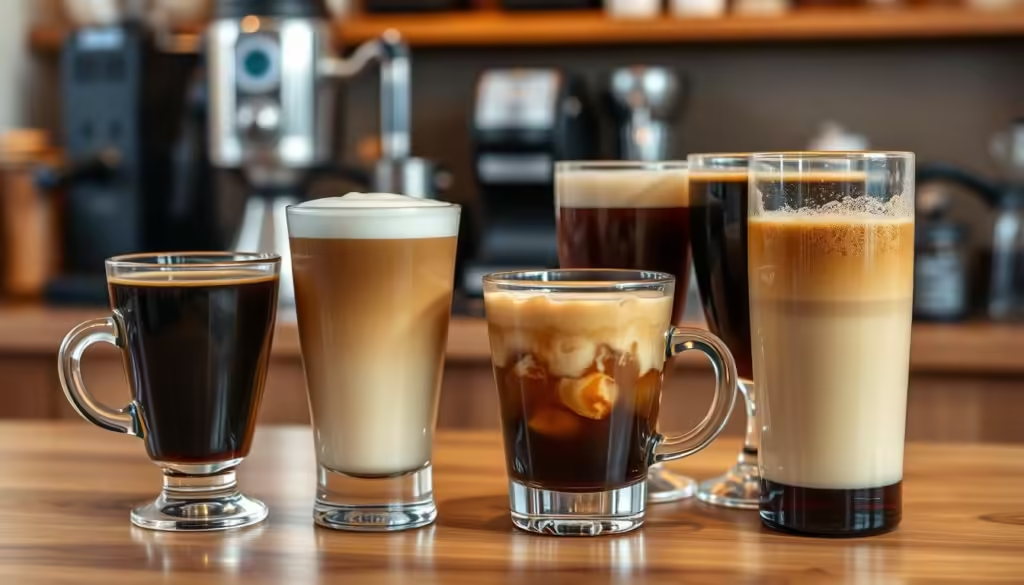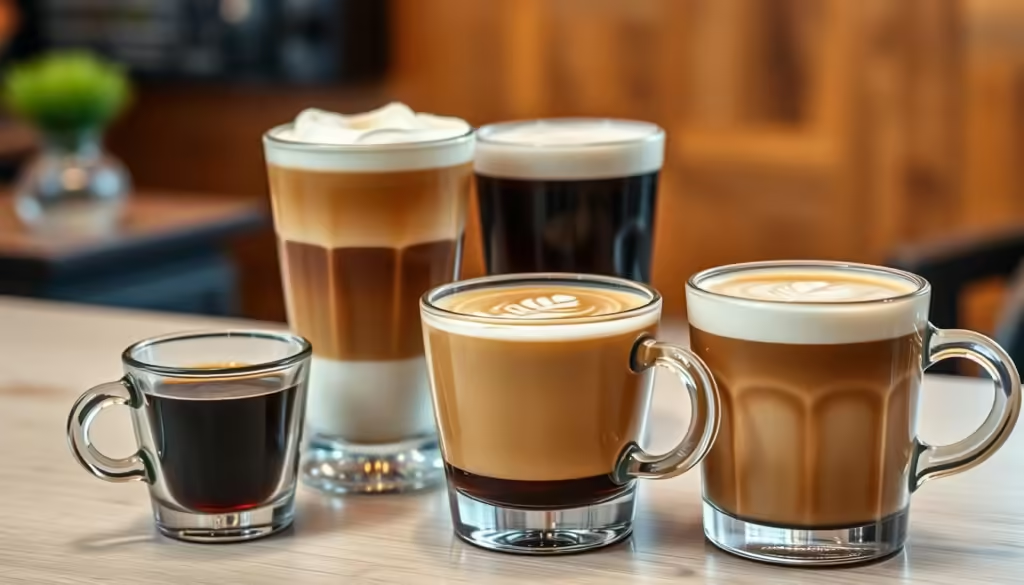
Did you know the average American adult drinks about 180 milligrams (mg) of caffeine daily? That’s like two cups of coffee. Caffeine is found in many things, like coffee, tea, energy drinks, soft drinks, and chocolate. Knowing how much caffeine is in what you drink is key to keeping track of your intake.
If you love coffee or just enjoy a caffeinated drink now and then, this guide is for you. It covers the caffeine in popular coffee drinks and other caffeinated items. With this info, you can choose what you drink wisely, based on what you like and what’s good for you.
Note : Curious about your daily caffeine intake? Use our Caffeine Calculator to find out exactly how much caffeine is in your favorite coffees.
Table of Contents
Understanding the Buzz: What is Caffeine?
Caffeine is a natural stimulant found in coffee beans, tea leaves, and cocoa beans. It boosts brain activity and releases chemicals like adrenaline and cortisol. It’s the most popular mood-altering drug in the world, beating out nicotine and alcohol.
Caffeine’s Effects on the Body
Caffeine can make you feel more alert and improve your mood. It can also help you feel less hungry and increase your heart rate and blood pressure. But too much caffeine can cause side effects like insomnia, anxiety, and more trips to the bathroom.
Mayo Clinic says a safe daily caffeine intake is about 400 milligrams for most adults. But everyone reacts differently to caffeine, leading to varied experiences with its effects.
Why Caffeine Levels Differ in Coffee
The amount of caffeine in coffee changes based on the bean type, roast, and brewing method. For instance, cold brew coffee has 153 – 238 milligrams of caffeine in a 12-ounce cup, as Medical News Today reports. Espresso shots usually have less caffeine than brewed coffee.
Knowing how caffeine affects you and why it varies is important for managing your intake. Listen to how your body reacts and adjust your caffeine use accordingly.
Caffeine Content in Brewed Coffee Variations

The caffeine in brewed coffee changes a lot based on how it’s made. You might like a simple brewed filter coffee, a decaf blend, or the strong taste of cold brew. Knowing how much caffeine each has can help you pick the best coffee for your day.
Brewed Filter Coffee
An 8-ounce cup of brewed filter coffee has about 96 milligrams of caffeine, the USDA says. The amount of caffeine can change based on the coffee beans, roast level, and how it’s brewed.
Decaffeinated Brewed Coffee
Decaffeinated coffee might seem like it has no caffeine, but it actually has a bit. An 8-ounce cup usually has 2 milligrams of caffeine. Even though it’s decaf, there can still be some caffeine left after the decaffeination process.
Cold Brew Coffee
Cold brew coffee is made by soaking coffee grounds in cold water. It tastes smooth and less acidic. But, it can have more caffeine. A 12-ounce serving might have 153 to 238 milligrams of caffeine, making it a strong choice for coffee lovers.
| Coffee Beverage | Caffeine Content (8 oz/240 ml) |
|---|---|
| Brewed Filter Coffee | 96 mg |
| Decaffeinated Brewed Coffee | 2 mg |
| Cold Brew Coffee (12 oz/370 ml) | 153-238 mg |
The caffeine in your coffee depends on the brewing method, the type of beans, and how much you drink. Whether you like a classic filter coffee, a decaf option, or the strong cold brew, knowing the caffeine levels helps you choose the right coffee for you.
Caffeine Content in Espresso-Based Drinks
Espresso-based drinks like lattes and cappuccinos are very popular. They get their caffeine from the espresso shots used to make them. Knowing how much caffeine is in these drinks helps you control your intake.
Espresso Shots
A single 1-ounce shot of espresso has about 63 mg of caffeine. This is more than a typical 8-ounce brewed coffee, which has around 96 mg. For a stronger caffeine kick, a double shot can give you up to 126 mg.
Lattes and Cappuccinos
Lattes and cappuccinos mix espresso with steamed milk. The caffeine in these drinks depends on the espresso to milk ratio. A small or tall latte or cappuccino with one shot has about 75 mg of caffeine. But, a grande or venti with two shots can have up to 150 mg.
The caffeine in these drinks can change based on the espresso’s strength, brewing method, and recipe. To know the exact caffeine, check the coffee shop’s nutrition info.
| Beverage | Caffeine Content (mg) |
|---|---|
| Espresso (1 oz) | 63 mg |
| Espresso (2 oz) | 126 mg |
| Latte or Cappuccino (Small/Tall) | 75 mg |
| Latte or Cappuccino (Grande/Venti) | 150 mg |
Knowing the caffeine in espresso-based drinks helps you choose wisely. It lets you manage your caffeine intake better.
Caffeine Content
Instant Coffee
Instant coffee is a popular choice for its convenience. It usually has less caffeine than freshly brewed coffee. An 8-oz cup of instant coffee has about 62 mg of caffeine on average. Despite having less caffeine, it still gives a quick energy boost.
Coffee Pod Brewing Systems
Coffee pod systems, like Nespresso, offer a variety of caffeine levels. The caffeine can range from 19 mg to 147 mg per serving. This lets coffee lovers adjust their caffeine intake to their liking.
| Caffeine Content Comparison | Amount (mg) |
|---|---|
| Brewed Coffee (8 oz) | 95 |
| Espresso Shot | 65 |
| Instant Coffee (8 oz) | 62 |
| Coffee Pod (Nespresso, 8 oz) | 19 – 147 |
| Black Tea (8 oz) | 47 |
| Green Tea (8 oz) | 28 |
The table shows the caffeine levels in various coffee and tea drinks. It helps consumers make better choices about their caffeine intake.
“Caffeine is a widely consumed stimulant that can have both beneficial and adverse effects on health, depending on the amount consumed.”
Conclusion
Caffeine levels in coffee can vary a lot. They can be as low as 2 mg in decaf coffee or over 200 mg in cold brew or energy drinks. Drinking up to 400 mg of caffeine a day is usually safe for healthy adults. But too much can cause problems.
Knowing how much caffeine is in coffee and tea is important. It helps you control your caffeine intake and choose wisely. Whether you like filtered coffee, espresso, or lattes, knowing the caffeine helps you enjoy them without harming your health.
The safe daily caffeine limit is 400 mg, which is like 2-3 cups of regular coffee. By sticking to this limit and knowing your drinks’ caffeine, you can enjoy coffee’s taste while keeping your health in check.
